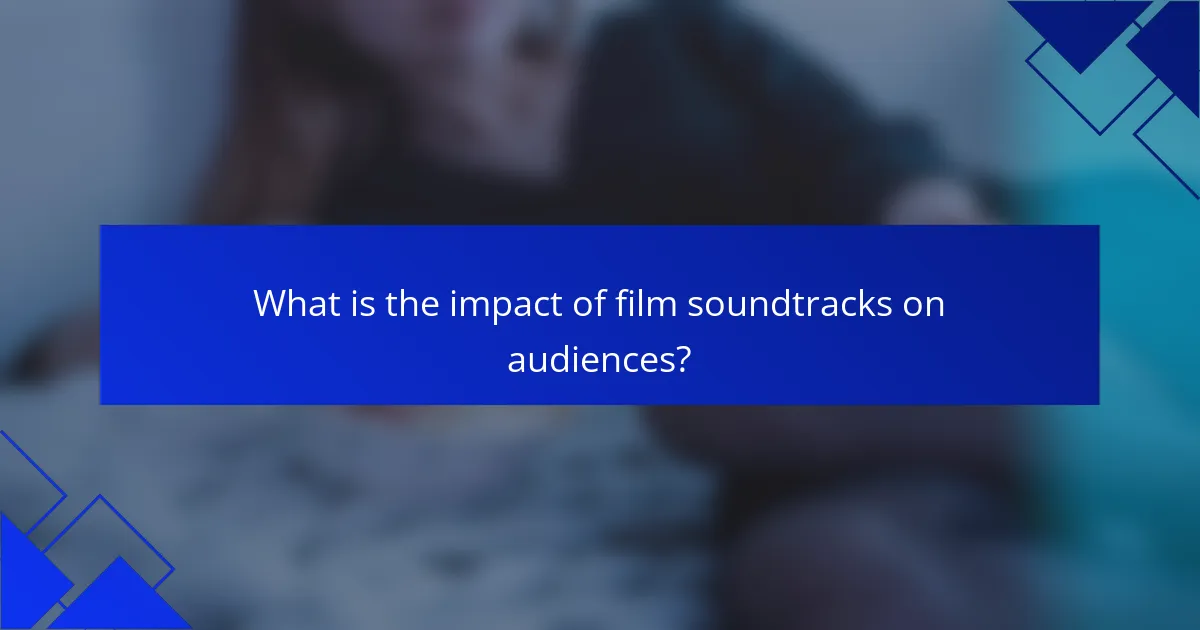
What is the impact of film soundtracks on audiences?
Film soundtracks significantly influence audiences by shaping their emotional responses. Music enhances the storytelling experience in films. It can evoke feelings such as joy, sadness, or tension. Research shows that soundtracks can improve memory recall of film scenes. For instance, a study published in the Journal of Film Music found that viewers retain more information when music is present. The emotional weight of a scene is often heightened by the accompanying score. Iconic composers, like John Williams, create memorable themes that resonate with audiences. Overall, soundtracks play a critical role in audience engagement and emotional immersion in films.
How do film soundtracks evoke emotional responses?
Film soundtracks evoke emotional responses through the use of music that aligns with the narrative and visuals. The combination of melody, harmony, and rhythm can enhance the mood of a scene. For instance, a suspenseful score can heighten tension during critical moments. Conversely, a soft, melodic theme can evoke feelings of nostalgia or sadness.
Research shows that specific musical elements, such as tempo and key, influence emotional perception. Fast tempos often elicit excitement, while slower tempos can induce calmness. Additionally, certain instruments can evoke specific emotions; strings might convey warmth, while brass can suggest power or urgency.
Studies indicate that audiences often experience a stronger emotional reaction when music is synchronized with visual storytelling. This synchronization creates an immersive experience, deepening the emotional impact of the film. The emotional responses elicited by soundtracks are not just subjective; they are supported by psychological research on music and emotion.
What psychological mechanisms are involved in emotional influence?
Emotional influence involves several psychological mechanisms, including emotional contagion, cognitive appraisal, and classical conditioning. Emotional contagion occurs when individuals mimic the emotions of others, leading to shared feelings. Cognitive appraisal refers to the evaluation of emotional stimuli, influencing how emotions are experienced and expressed. Classical conditioning links emotional responses to specific stimuli through repeated associations. Research indicates that soundtracks can evoke emotions by enhancing these mechanisms. For example, studies show that music can significantly alter mood and emotional responses in viewers. This demonstrates the powerful role of psychological mechanisms in shaping emotional influence through film soundtracks.
How do different genres of film soundtracks affect emotions differently?
Different genres of film soundtracks evoke distinct emotional responses. For example, orchestral scores in drama films often enhance feelings of sadness or tension. Research shows that classical music can trigger emotional depth and reflection. In contrast, upbeat pop tracks in comedies promote feelings of joy and laughter. Studies indicate that fast tempos correlate with increased energy and excitement. Horror films typically use dissonant sounds to instill fear and anxiety. This technique relies on unsettling audio cues to heighten suspense. Additionally, romantic films often feature soft melodies that elicit feelings of love and nostalgia. The emotional impact of soundtracks is supported by psychological studies linking music to mood regulation. Overall, the genre of a film’s soundtrack plays a crucial role in shaping audience emotions.
What role do iconic composers play in film soundtracks?
Iconic composers play a crucial role in shaping the emotional landscape of film soundtracks. They create music that enhances the narrative and deepens audience engagement. Their compositions often evoke specific feelings, guiding viewers’ emotional responses to scenes. For instance, John Williams’ scores in films like “Star Wars” and “Jaws” have become synonymous with their respective narratives. Such music can signal tension, joy, or sadness, influencing the overall viewing experience. Additionally, iconic composers often establish recognizable themes that become integral to a film’s identity. This connection between music and film can lead to lasting cultural impact, as seen with composers like Ennio Morricone and Hans Zimmer. Their work not only supports storytelling but also elevates the cinematic art form.
Who are some of the most influential film composers in history?
Some of the most influential film composers in history include John Williams, Ennio Morricone, and Hans Zimmer. John Williams is known for iconic scores in films like “Star Wars” and “Jaws.” His work has earned him five Academy Awards. Ennio Morricone composed memorable music for “The Good, the Bad and the Ugly.” His unique style has influenced many filmmakers. Hans Zimmer is recognized for his innovative scores in films such as “Inception” and “The Lion King.” He has won two Academy Awards and multiple Grammy Awards. These composers have significantly shaped the film industry with their distinctive musical styles.
How do composers create memorable themes and motifs?
Composers create memorable themes and motifs by utilizing distinct melodic lines, harmonies, and rhythms. They often focus on simplicity to ensure the theme is easily recognizable. Repetition is a key technique; it reinforces the theme in the listener’s memory. Variations of the original theme can evoke different emotions while maintaining familiarity. Additionally, composers may use orchestration to enhance the thematic material, creating a unique sound palette. Historical examples include John Williams’ “Star Wars” theme, which combines these elements effectively. Research indicates that themes with emotional resonance are more likely to be remembered, as shown in studies on music cognition.
What are the characteristics of memorable songs in film soundtracks?
Memorable songs in film soundtracks often feature strong melodies and emotional resonance. These songs enhance the narrative and evoke specific feelings in the audience. They are typically well-integrated with the film’s themes and visuals. Iconic songs often have relatable lyrics that connect with viewers on a personal level. Additionally, memorable soundtracks frequently utilize repetition, making them easily recognizable. Collaborations with renowned artists can also elevate a song’s impact. Historical examples include “My Heart Will Go On” from Titanic, which became synonymous with the film’s love story. Such songs often achieve commercial success, further solidifying their place in popular culture.
How do lyrics contribute to the emotional impact of a song?
Lyrics significantly enhance the emotional impact of a song. They convey themes and stories that resonate with listeners. Emotional language in lyrics can evoke feelings such as joy, sadness, or nostalgia. For instance, songs like “Hallelujah” by Leonard Cohen use poignant imagery to elicit deep emotional responses. Research indicates that lyrics can activate brain regions associated with emotion. A study published in the journal “Psychology of Music” found that lyrical content influences listeners’ emotional reactions more than melody alone. Thus, lyrics are crucial in shaping the overall emotional experience of a song.
What role does melody play in making a song memorable?
Melody is crucial in making a song memorable. It serves as the primary element that listeners associate with a song. A catchy melody can evoke strong emotions and create lasting impressions. Research shows that melodies activate the brain’s reward system, enhancing recall. For example, studies indicate that songs with simple, repetitive melodies are easier to remember. This is because they create familiarity, which aids memory retention. Additionally, memorable melodies often feature unique intervals and rhythms that stand out. These characteristics differentiate songs in a listener’s mind, making them more likely to be recalled.
How do film soundtracks enhance storytelling?
Film soundtracks enhance storytelling by creating emotional depth and atmosphere. They evoke feelings that align with the narrative. For example, suspenseful music heightens tension in thrilling scenes. Conversely, uplifting scores can signify hope or joy. Soundtracks also provide cultural context, enriching the viewer’s understanding of the setting. Iconic themes can become synonymous with characters, reinforcing their identities. Research shows that music influences audience engagement and retention of plot details. A study by the University of Southern California found that soundtracks significantly affect viewers’ emotional responses. This demonstrates the powerful role soundtracks play in shaping cinematic experiences.
In what ways do soundtracks complement visual elements in films?
Soundtracks enhance visual elements in films by creating emotional resonance. They set the tone and mood, influencing audience reactions. For instance, a suspenseful score can heighten tension during critical scenes. Conversely, uplifting music can evoke feelings of joy or hope. Soundtracks also provide context, helping to convey the story’s setting or time period. Iconic themes can become synonymous with characters, reinforcing their identities. Studies show that music can significantly affect viewer engagement and memory retention. Overall, soundtracks are essential for deepening the audience’s connection to the visual narrative.
How can soundtracks shape audience perceptions of characters and plot?
Soundtracks significantly shape audience perceptions of characters and plot. They enhance emotional engagement and influence mood. For example, a suspenseful score can create tension and anticipation. Conversely, a lighthearted tune may evoke joy and comfort. Specific musical themes can represent characters, making them more relatable. Iconic soundtracks, like those from “Star Wars,” establish immediate recognition of characters and their journeys. Research shows that music can alter viewers’ interpretations of scenes. In a study by Bigand and Poulin-Charronnat, music affected the perception of emotional content in film clips. Thus, soundtracks are crucial in guiding audience understanding and emotional responses.

What trends are emerging in film soundtracks today?
Emerging trends in film soundtracks today include the integration of diverse musical genres and the use of technology in composition. Filmmakers increasingly blend traditional orchestration with contemporary styles like hip-hop and electronic music. This fusion creates unique soundscapes that resonate with modern audiences. Additionally, advancements in digital audio tools allow composers to experiment more freely. For instance, AI-generated music is becoming a notable element in some projects. Collaborations with popular artists also enhance soundtracks, drawing in wider audiences. The trend of using pre-existing songs to evoke nostalgia remains strong, as seen in recent blockbuster films. Overall, these trends reflect the evolving landscape of film music and its role in storytelling.
How is technology influencing the creation of film soundtracks?
Technology is significantly influencing the creation of film soundtracks. Digital audio workstations (DAWs) allow composers to produce, edit, and mix music with precision. Software instruments and plugins expand the range of sounds available to creators. This technology enables the integration of various musical styles seamlessly. Additionally, virtual reality tools enhance the immersive experience of sound in films. Streaming platforms facilitate easy distribution and collaboration among artists. The use of artificial intelligence in composing has emerged, generating unique musical ideas. Advanced sound editing software improves the overall quality of soundtracks. These technological advancements are reshaping how film music is composed and experienced.
What new tools are composers using to craft soundtracks?
Composers are increasingly using digital audio workstations (DAWs) to craft soundtracks. DAWs like Ableton Live, Logic Pro, and FL Studio allow for advanced audio manipulation. These tools enable composers to integrate virtual instruments and sample libraries seamlessly. Additionally, composers are utilizing plugins for sound design and effects processing. Tools like Serum and Omnisphere offer unique sound synthesis options. Furthermore, cloud-based collaboration platforms are becoming popular among composers. These platforms facilitate real-time collaboration with other musicians and sound designers. The use of artificial intelligence in music composition is also on the rise. AI tools can assist in generating melodies and harmonies, enhancing creativity. These advancements are transforming the landscape of soundtrack creation.
How are streaming platforms changing the consumption of film soundtracks?
Streaming platforms are significantly changing the consumption of film soundtracks. They provide instant access to a vast library of soundtracks. Users can listen to soundtracks on-demand, rather than waiting for physical releases. This convenience has increased the popularity of film soundtracks. According to a 2022 report by the International Federation of the Phonographic Industry, streaming accounted for over 80% of global music consumption. Additionally, playlists featuring film soundtracks are now curated and shared widely on these platforms. This promotes soundtracks beyond the film’s release period. As a result, listeners often discover soundtracks independently from the films. This shift enhances the overall cultural relevance of film music in contemporary media consumption.
What is the future of film soundtracks in the industry?
The future of film soundtracks in the industry will increasingly incorporate technology and diverse musical styles. Advances in artificial intelligence are enabling composers to create more personalized and adaptive soundtracks. Streaming platforms are altering how soundtracks are distributed and consumed, leading to a more global reach. Collaborations between filmmakers and popular artists are becoming more common, enhancing the emotional impact of films. Additionally, immersive audio technologies, such as Dolby Atmos, are reshaping how sound is experienced in theaters and at home. This evolution is reflected in successful films that utilize innovative sound design to enhance storytelling. As audience expectations grow, soundtracks will continue to play a crucial role in the overall cinematic experience.
How might the rise of virtual reality affect film soundtracks?
The rise of virtual reality (VR) may significantly transform film soundtracks. VR offers immersive experiences that engage multiple senses, including sound. Traditional soundtracks may evolve to include spatial audio techniques. This allows sounds to move dynamically around the viewer, enhancing realism. For instance, 3D audio can create an enveloping sound environment.
Studies show that immersive audio increases emotional engagement in media. A report by the Audio Engineering Society highlights how spatial audio can enhance storytelling. This suggests that soundtracks in VR could become more integral to narrative experiences. Additionally, composers may need to adapt their techniques for these new formats. They will likely focus on creating interactive soundscapes that respond to user movements.
As VR technology advances, soundtracks will likely become more complex and layered. This evolution will cater to a more engaged audience seeking deeper emotional connections.
What potential collaborations could reshape the sound of film music?
Collaborations between film composers and contemporary artists could reshape the sound of film music. For example, pairing established film composers like Hans Zimmer with popular musicians such as Billie Eilish could create innovative soundscapes. This blending of genres can attract diverse audiences and enhance emotional storytelling. Recent examples include the collaboration of composer Ramin Djawadi with artists like Travis Scott for “Westworld.” Such partnerships can also incorporate modern production techniques, making soundtracks more relevant to current trends. Additionally, collaborations with technology innovators in sound design could further transform how music is integrated into film. These potential collaborations reflect a growing trend in the industry towards merging traditional composition with contemporary influences.

What practical tips can filmmakers use to choose effective soundtracks?
Filmmakers can choose effective soundtracks by considering the emotional tone of their film. The soundtrack should align with the narrative and character arcs. Selecting music that enhances the mood can deepen audience engagement. Filmmakers should also consider the pacing of scenes when choosing tracks. Fast-paced scenes benefit from upbeat music, while slow scenes may require softer melodies.
Additionally, understanding the target audience is crucial. Different demographics respond to various musical styles. Filmmakers should analyze similar films to identify successful soundtracks. They can also collaborate with composers to create original scores tailored to their film’s needs. Testing soundtracks with focus groups can provide valuable feedback. Finally, filmmakers should ensure that licensing and budget constraints are considered early in the selection process.
How can filmmakers select music that aligns with their film’s themes?
Filmmakers can select music that aligns with their film’s themes by analyzing the emotional tone of their narrative. They should identify key moments in the script that evoke specific feelings. Next, filmmakers can explore genres and styles that resonate with these emotions. Collaborating with composers or music supervisors can provide tailored options. Additionally, filmmakers can reference existing soundtracks that successfully convey similar themes. Research shows that music significantly enhances emotional engagement in film. A study by the University of Southern California reveals that soundtracks can influence audience perception and memory of scenes.
What are some common mistakes to avoid when choosing a soundtrack?
Choosing a soundtrack can lead to errors that affect the overall impact of a film. One common mistake is failing to match the music’s mood with the scene’s emotional tone. This can result in disconnection between visuals and audio. Another mistake is overusing popular songs, which may distract rather than enhance the narrative. Ignoring the target audience’s preferences can also alienate viewers. Additionally, selecting music that is too complex can overwhelm the audience, detracting from the storyline. Lastly, neglecting to consider the film’s pacing can lead to jarring transitions between scenes. These mistakes can diminish the film’s emotional resonance and viewer engagement.
How can filmmakers collaborate effectively with composers and artists?
Filmmakers can collaborate effectively with composers and artists by establishing clear communication from the start. This includes discussing the film’s vision, themes, and emotional tone. Regular meetings and brainstorming sessions foster a shared understanding. Filmmakers should provide reference materials, such as soundtracks or specific scenes, to guide composers. Creating a timeline with milestones helps ensure that both parties stay on track. Feedback should be constructive and timely to enhance the creative process. Collaborating in a flexible manner allows for creative experimentation. Successful collaborations often lead to innovative soundscapes that enhance storytelling, as seen in films like “Inception” with Hans Zimmer’s score.
The main entity of this article is film soundtracks, which significantly influence audience emotions and enhance storytelling. The article explores how soundtracks evoke emotional responses through various musical elements and psychological mechanisms, highlighting the impact of different genres and iconic composers like John Williams and Hans Zimmer. It also discusses the characteristics of memorable songs, the role of technology in soundtrack creation, and emerging trends in the industry. Additionally, practical tips for filmmakers on selecting effective soundtracks are provided, emphasizing the importance of aligning music with film themes and audience expectations.